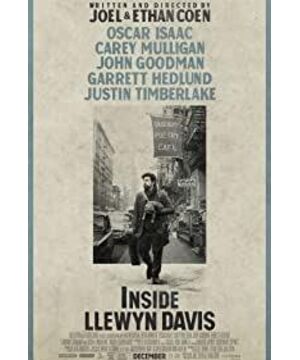Songs " interprets Wei Dan
as independent filmmakers, the Coen brothers, and directed a distinctive musical "Drunk Country Folk Songs", which not only continued their usual style, but also won It won the 2013 Cannes Film Festival Jury Award and received wide acclaim. This film shows the unique style and high level of the Coen Brothers both in form and content. The Coen Brothers' film has both commercial elements and profound cultural significance. The entertaining and far-reaching nature of their works makes the film difficult to interpret, but their works always pay attention to ordinary people. "Drunk Country Folk Songs" is a very unique piece of the Coen Brothers film works.
1. Characters
in the film Coen brothers’ films often tell the story of losers. Ethan once frankly believed that "career will easily become a career later. When you start, everything is new and exciting. Yes. This feeling will never return, so to some extent, when you start to take the first step, everything is going downhill.
The protagonist Luen in the film "Drunk Country Folk Songs" is not an inspirational one. A successful person, but a frustrated loser. In the film, Luen’s life is in a dysphoria. He lives on a friend’s sofa and sings in a bar to make a living; even his career has not improved, and the recorded records are not cared about; he even To borrow money to make a living, his beloved Gene in the film also gave him a very bad evaluation, and the conversation with him was full of swearing words. The beginning of the film was when Luen sang a song in a small bar and was brutally killed in a dark back alley. Beat it up. As the movie unfolds, this little character tries to make a change. He went through a trip from New York to Chicago and finally returned without success. This talented folk singer hits a wall everywhere in his life. It's a complete one. Unlucky and loser.
There is a kind of loser like Luen hidden in the whole movie, and these people and Luen constitute a strong contrast. The first is Jim and Jean. This male and female duet is both a folk singer like Rune and a friend of Rune. They also make a living by singing in a small bar, but they are obviously different from Rune. In a quarrel with Luen, Gene pointed out the difference. Compared with Gene and Jim have been working hard to enter the mainstream music circle, Luen refused to form a group, and he was quite reluctant to sing popular songs. Jim wrote and recorded the song "Please Mr. This can be seen in "Kennedy". Next is Mike, who did not appear on the stage. Mike was Rune’s former partner. The cause of his death was not explained in the movie. However, we can understand from the song "If we had wings" that they once collaborated with. Mike is also an aspiring young man. Without stress and desperation, he jumped off the Washington Bridge. And Mike’s death also brought a huge shadow to Luen. Not only was the breakup of the combination making Luen’s career as a singer increasingly difficult, he could not enter the mainstream music circle (a very popular group musician in the 60s), but also brought it to In spite of Lu En's tremendous mental shock, when he sang songs, he refused to hum the chorus part of Mike by his friend Lillian; he also refused to form a group again. These characters around Luen constitute the epitome of the low-level artists of an era. The background of the film is the United States in the 1960s, which is the eve of the golden age of folk songs. From this point of view, Luen's insistence on music is the persistence of a group of people in that era. Luen's failure also mirrors the failure of a group of people. This is what touches the movie.
Luen’s character prototype is the folk singer Dave Van Lang in the 1960s, but the movie is not a biopic of the folk singer. Luen’s failure in the movie is different from the real situation. Luen’s failure can be seen as an accident of fate. He failed in an interview in Chicago and lost another popular opportunity; it was also an inevitable fate. Luen tried to compromise to become a sailor (this was a career he despised before. ), but fate did not allow him to get what he wanted, he did not become a sailor, and he didn't even have the only money he had. After going around, Luen returned to the original point and continued to sing in the small bar.
Second, the special symbols in the
film In addition to the roles needed for the development of the plot, there are often some special roles in the film, and they bear a symbolic meaning.
The first is cats everywhere. The film interestingly projects Lu En’s struggles and struggles onto the cat, so the cat and Lu En appearing in the film are basically heterogeneous. When he first appeared on the stage, the cat slipped away from the moment Luen opened the door, which already hinted that Luen was trying to break the status quo; then the cat completely escaped from the fire escape, after which Luen embarked on a dream journey to Chicago; Luen returned to New York When he ran into a cat, the blood remaining on the car alluded to the price Luen paid when he fought. In the night, Luen and the cat complete the isomorphism of the two in an instant, and the cat is Luen. In the film, the cat that Luen caught by the wrong alluded to Luen’s loss; the lost cat finally returned to the professor’s home, indicating that after a bloody struggle, Luen once again returned to the original starting point. . From this point of view, the cat is actually Lu En's insinuation. What’s interesting is that the cat is called Ulysses. The name comes from Homer’s epic "Odyssey". This epic tells the adventure story of the Greek hero Odyssey (Roman name Ulysses) after his victory in the Trojan War and on his way home. The Odyssey After ten years of drifting, I finally reunited with my family. In the movie, the cat used this book for reference from being lost to returning home, and gave the wandering a kind of spiritual symbolic meaning.
The second is the two people Luen met on his way to Chicago, jazz musician Roland Turner and actor Johnny Pfeiffer. Roland Turner's disdain and ridicule of Luen, and Johnny Pfeiffer's indifference to Luen all symbolize the attitude of contemporaries towards folk singers. What is worth noting is a passage from Roland Turner, "No matter what I do, I just can't succeed. I simply do nothing. My life is a pot of shit. I don't know how I made such a pot of shit. "In fact, the jazz musician Roland Turner and the actor Johnny Pfeiffer were also failures who did nothing. Their existence proved the existence of a group, and they both disappeared in the way of Luen's dream (Roland Turner fell in the toilet, Johnny Phoebe was taken away by the police), all heralded the end of this trip.
3. The lens language of the film The lens language
can tell the director's shooting intention. The Coen brothers are good at using the rich lens language to express the emotions of the characters and highlight the theme.
In "Drunken Country Folk Songs", close-up shots are often used to focus on the facial expressions of the characters, and the emotions of the characters are expressed in conjunction with the large-scale contrast of light and dark. At the beginning of the movie, the sound comes first, followed by a close-up of the microphone. After the lens is shifted, Luen’s head close-up occupies the right screen, and the light only illuminates half of Luen’s face, following the slight shaking of the lens and the natural nature of the protagonist’s body Shaking, the light and dark constantly change in Luen's face, conveying the subtle emotions in the protagonist's heart. Immediately after the camera was opened, we found that Luen was performing in a dark small bar. The small and cramped small bar had various characters in a dark and muddy picture, which made Luen on the stage a clear sense of loneliness and loneliness. A sense of alienation from the crowd.
It is also worth mentioning that "Drunk Country Folk Songs" cleverly uses music to promote the development of the plot. The function of music is to pave the way for the emotions of the characters at different stages, allowing the audience to enter the psychological world of the characters and present a unique tension. The depression and helplessness in the opening song "Hang Me, Oh Hang Me", the funny and discomfort shown in "Please Mr. Kennedy". There are exceptions. When singing "The Death of Queen Jane" at the door of the horn, the director slowly advances the shot, and the emotions of the characters are slowly revealed with the music. When the viewers look forward to the reversal of Luen's fate , The expressionless image of the music giant Bud Gromans occupies the center of the entire screen. Luen did not succeed. This is the most direct demonstration of the conflict between ideal and reality in the film. This contrast between emotions and reality is not only a deliberate black humor, but also a ridicule and irony of the protagonist's fate. It seems that Luen’s failure came from accidental reality, but the film ultimately attributed the failure to the unpredictable and inevitable destiny. The popularity of "Please Mr. Kennedy" did not bring a turning point in Luen’s life, just as destiny did to Lu. En's joke left him with nothing on the road to chasing his dreams.
The composition of the movie also matches the development of the characters. The Coen brothers’ movies seem to be particularly fond of small spaces. For example, when Luen knocked on Jean’s door, Luen appeared in the middle of the screen, with the long and narrow corridors on both sides of the screen. The door constitutes a narrow and cramped triangular space, which is a portrayal of Luen's distressed status quo. Roland Turner, played by John Goodman, occupies the back seat of a car with a huge body, which is symbolic. From time to time, crowded bars, narrow aisles and cramped cars appear in the movie, which also show Luen's living space to varying degrees and reveal the theme of the movie.
4. The theme of the
movie The beginning and end of the movie are the same scene-Luen was beaten by a stranger in the back alley after singing in a small bar. However, this must not be regarded as a repetition. In terms of content, The beginning did not fully explain the reason why Luen was beaten, thus setting up suspense for the viewer; from the formal point of view, this arrangement completely showed a stage of Luen’s life, showing a ring structure. Dissatisfied with the status quo and ran away from Chicago, and finally returned to the small bar; from the theme, this circular structure actually implies a group of losers like Luen, and after struggling and wandering, they returned to the original point and never showed the little people. Sadness and joy and destiny.
So what was the reason for Luen's failure? On the surface, the story of the movie is a life course of Luen, but in fact, this is another life course that all living beings have to go through. The hand of fate that often appears in the Coen Brothers movies always tortured these low-level characters, and the movies should be regarded as an interpretation of fate. The theme of "Drunk Country Folk Songs" jumps out of the narrow circle that reflects the sorrows and joys of the creative individual, and has extensive referential implications. Luen's failure and loneliness is a destiny in a broad sense. Luen's struggles and failures are a meaningless illusory movement. There are many accidental factors in Luen's life. For example, the death of his partner Mike forced the group to disband. For example, Luen gave up the copyright of the song "Please Mr. Kennedy", and the song became popular. But Luen’s failure was also an inevitable result. Both Luen’s personal factors-his unwillingness to compromise, were also due to the background of the great era. The whole movie was shrouded in a strong feeling of nostalgia (the picture's Gray-blue tone), this movie not only describes a group of people, but also an era; there are both the sadness of individual lives and the sentimentality of the era. Only by caring for the lives and lives of individuals in a broad sense can we gain an understanding of this film.
(Please indicate the author for reprinting, thank you.)
View more about Inside Llewyn Davis reviews











